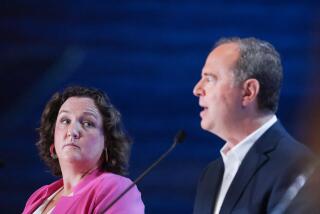Bachmann’s had her share of government aid
WASHINGTON — Rep. Michele Bachmann has been propelled into the 2012 presidential contest in part by her insistent calls to reduce federal spending, a pitch in tune with the big-government antipathy gripping many conservatives.
But theMinnesota Republican and her family have benefited personally from government aid, an examination of her record and finances shows. A counseling clinic run by her husband has received nearly $30,000 from the state ofMinnesota in the last five years, money that in part came from the federal government. A family farm in Wisconsin, in which the congresswoman is a partner, received nearly $260,000 in federal farm subsidies.
And she has sought to keep federal money flowing to her constituents. After publicly criticizing the Obama administration’s stimulus program, Bachmann requested stimulus funds to support projects in her district. Although she has been a fierce critic of earmarks -- calling them “part of the root problem with Washington’s spending addiction” -- the congresswoman nonetheless argued recently that transportation projects should not be considered congressional pork.
As Bachmann prepares to formally launch her presidential bid Monday in Waterloo, Iowa, Republican strategists warned that she needs to square her record with her public pronouncements.
“She’s kind of built an area in the field of candidates where she’s the hawk on those kinds of issues, so any sort of issue that will show her record is not totally consistent will affect some of her support,” said Craig Robinson, a former political director of the Iowa GOP. “I don’t think it’s a deal-breaker, but I think it’s something she’s going to have to be willing to confront head-on.”
For now, Bachmann is declining to answer questions on the topic. Her congressional and campaign staff did not respond to numerous requests for comment.
Bachmann has long sought to distance herself from those who benefit from public money. “I don’t need government to be successful,” she proudly told Fox News host Bill O’Reilly in fall 2009 when he asked why she inspired such ire among liberal critics.
Yet despite her broadsides against “socialized medicine,” Bachmann’s husband, Marcus, applied for public funds for his counseling clinic, Bachmann & Associates. Since 2006, he has received nearly $30,000, according toMinnesota state records. The bulk of the money -- $24,041 -- came in the form of grants from the state Department of Human Services to train staff how to deal with clients suffering from chemical dependency and mental illness. That program was financed in part by the federal government.
Michele Bachmann lists the Lake Elmo, Minn.-based clinic -- which aims to provide “quality Christian counseling in a sensitive, loving environment,” according to its website -- as one of her assets on her financial disclosure forms.
Another of Bachmann’s assets -- a family farm owned by her late father-in-law, Paul Bachmann -- received nearly $260,000 in federal money between 1995 and 2008, largely from corn and dairy subsidies, according to U.S. Department of Agriculture data compiled by the Environmental Working Group, a nonprofit research organization that scrutinizes such subsidies. Paul Bachmann died in May 2009, but the congresswoman retains a partnership in the farm.
Bachmann said in December that the subsidies went to her in-laws and she never received “one penny” from the farm, according to the Minneapolis Star-Tribune. However, in financial disclosure forms, she reported receiving between $32,503 and $105,000 in income from the farm, at minimum, between 2006 and 2009.
Publicly, Bachmann has objected strongly to federal farm payments.
When she voted against the 2008 farm bill, a $307-billion package that would govern federal agriculture policy for five years, Bachmann declared that it was “loaded with unbelievably outrageous pork and subsidies for agricultural business and ethanol growers.” She was one of two nays cast byMinnesota’s eight-member delegation.
Just a year later, however, Bachmann wrote to Agriculture Secretary Tom Vilsack, praising the federal government for helping prop up the prices of pig products and dairy by directly buying the commodities, a move that benefited her constituents.
“I would encourage you to take any additional steps necessary to prevent further deterioration of these critical industries, such as making additional commodity purchases,” she wrote on Oct. 5, 2009. The Los Angeles Times/Tribune Washington Bureau obtained the letter through a Freedom of Information Act request.
The USDA that year had stepped up its purchase of pork and dairy products for use in school lunches and other government food programs, seeking to stabilize prices in the then-flagging industries.
While not technically a subsidy, commodity purchase programs are “a deliberate effort of the government to prop up these industries,” said David DeGennaro, legislative analyst for the Environmental Working Group.
More recently, Bachmann objected strongly to the Obama administration’s $830-billion stimulus package, saying before the 2009 congressional vote on the matter: “I cannot support this new direction for the American economy.”
But seven months later, Bachmann wrote six letters to Transportation Secretary Ray LaHood asking for stimulus-financed grants for infrastructure projects in her district, such as expanding commuter rail and constructing a bridge over St. Croix River. (The letters were first reported by the Center for Public Integrity.)
In the end, none of the requests received funding, according to the Minnesota Department of Transportation. Bachmann continues to blast the stimulus, saying in her State of the Union response in January that “the president’s strategy for recovery was to spend a trillion dollars on a failed stimulus program, fueled by borrowed money.”
GOP strategist Steve Grubbs said he didn’t view Bachmann’s requests as damaging to her fiscal credibility.
“Just because you’re against government spending doesn’t mean you shouldn’t get any funds you’re legally entitled to,” said Grubbs, a former chairman of the Iowa Republican Party. “Lobbying for basic transportation needs in your district is what your job is as a congresswoman. If she was lobbying to put a rainforest in Minnesota, I think people would see that as disingenuous.”
Bachmann told the Minneapolis Star-Tribune in November that transportation projects should not be considered earmarks. “There’s a big difference between funding a tea pot museum and a bridge over a vital waterway,” she said.
Steve Ellis, vice president of Taxpayers for Common Sense, a nonpartisan budget watchdog group, said such reasoning was “ridiculous,” adding: “That sounds like a pretty big loophole to me.”
As Bachmann pursues the presidency, Ellis said, her record will face tougher scrutiny.
“If you want to talk about the debt and deficit and reigning in wasteful spending, you have to look in the mirror and make sure you’re living a fiscally pure life as well,” he said.
melanie.mason@latimes.com
matea.gold@latimes.com
More to Read
Get the L.A. Times Politics newsletter
Deeply reported insights into legislation, politics and policy from Sacramento, Washington and beyond. In your inbox three times per week.
You may occasionally receive promotional content from the Los Angeles Times.











